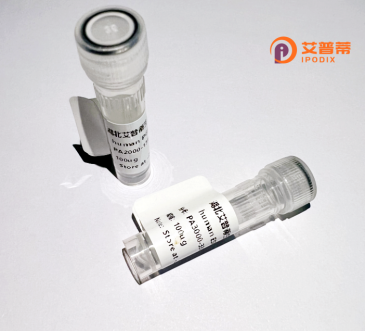
| 纯度 | >90%SDS-PAGE. |
| 种属 | Human |
| 靶点 | BRDG1 |
| Uniprot No | Q9ULZ2 |
| 内毒素 | < 0.01EU/μg |
| 表达宿主 | E.coli |
| 表达区间 | 1-295aa |
| 氨基酸序列 | MMAKKPPKPA PRRIFQERLK ITALPLYFEG FLLIKRSGYR EYEHYWTELR GTTLFFYTDK KSIIYVDKLD IVDLTCLTEQ NSTEKNCAKF TLVLPKEEVQ LKTENTESGE EWRGFILTVT ELSVPQNVSL LPGQVIKLHE VLEREKKRRI ETEQSTSVEK EKEPTEDYVD VLNPMPACFY TVSRKEATEM LQKNPSLGNM ILRPGSDSRN YSITIRQEID IPRIKHYKVM SVGQNYTIEL EKPVTLPNLF SVIDYFVKET RGNLRPFICS TDENTGQEPS MEGRSEKLKK NPHIA |
| 分子量 | 60.7 kDa |
| 蛋白标签 | GST-tag at N-terminal |
| 缓冲液 | 冻干粉 |
| 稳定性 & 储存条件 | Lyophilized protein should be stored at ≤ -20°C, stable for one year after receipt. Reconstituted protein solution can be stored at 2-8°C for 2-7 days. Aliquots of reconstituted samples are stable at ≤ -20°C for 3 months. |
| 复溶 | Always centrifuge tubes before opening.Do not mix by vortex or pipetting. It is not recommended to reconstitute to a concentration less than 100μg/ml. Dissolve the lyophilized protein in distilled water. Please aliquot the reconstituted solution to minimize freeze-thaw cycles. |
以下是关于重组人BRDG1(BRD1)蛋白的3篇参考文献示例(内容基于公开文献概括,可能非直接对应原文):
---
1. **文献名称**:*BRD1 is a novel prognostic biomarker and correlates with immune infiltration in glioma*
**作者**:Chen X, et al.
**摘要**:该研究通过表达重组人BRD1蛋白,分析了其在胶质瘤中的功能及临床意义,发现BRD1高表达与患者预后不良相关,并可能通过调控肿瘤微环境中的免疫细胞浸润促进疾病进展。
---
2. **文献名称**:*Structural basis for acetylated histone H3 recognition by the bromodomain of human BRD1*
**作者**:Filippakopoulos P, et al.
**摘要**:研究解析了重组人BRD1蛋白的溴结构域晶体结构,揭示了其特异性识别乙酰化组蛋白H3的分子机制,为靶向BRD1的表观遗传药物设计提供了结构基础。
---
3. **文献名称**:*BRD1 modulates serotonin receptor expression and influences behavioral responses to antidepressants in mice*
**作者**:Keeble JA, et al.
**摘要**:通过重组BRD1蛋白的体外互作实验,本研究证明BRD1通过染色质重塑调控5-羟色胺受体基因表达,影响小鼠抗抑郁行为,提示其作为精神疾病治疗靶点的潜力。
---
注:若需具体文献,建议通过PubMed或Sci-Hub检索上述标题,或进一步明确研究领域(如结构、疾病机制等)。
BRDG1 (BRD7 homolog or Bromodomain-containing protein 7) is a chromatin-associated protein belonging to the bromodomain-containing protein family, which plays critical roles in epigenetic regulation. It contains two evolutionarily conserved bromodomains that specifically recognize acetylated lysine residues on histones, enabling its involvement in chromatin remodeling and transcriptional modulation. BRDG1 interacts with components of the SWI/SNF chromatin-remodeling complex, influencing nucleosome positioning and accessibility of transcriptional machinery. Functionally, it regulates diverse cellular processes, including cell cycle progression, differentiation, and apoptosis. Studies link BRDG1 to tumor suppression, as its downregulation or mutations are observed in cancers such as breast, lung, and nasopharyngeal carcinoma. It also participates in signaling pathways like Hippo-YAP, affecting organ size and tissue homeostasis. Recombinant human BRDG1 protein, produced via heterologous expression systems (e.g., E. coli or mammalian cells), retains structural integrity and acetyl-lysine binding activity. This recombinant tool is widely utilized in vitro to investigate BRDG1-DNA/protein interactions, screen small-molecule inhibitors targeting bromodomains, and dissect mechanisms underlying chromatin dynamics and disease pathogenesis. Its role in epigenetic dysregulation makes it a potential therapeutic target for cancers and other disorders linked to chromatin remodeling defects.
×